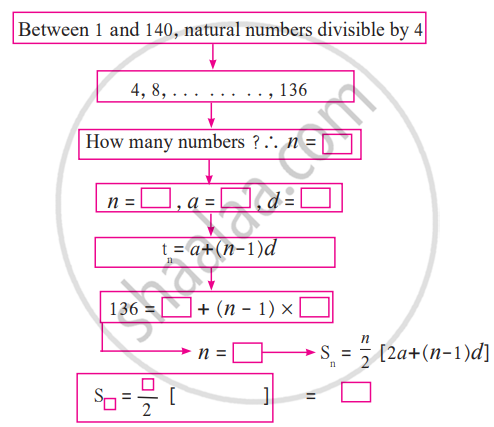Advertisements
Advertisements
प्रश्न
Find the first two terms of the sequence for which Sn is given below: `S_n=n^2(n+1)`
उत्तर
To find the first term, substitute n = 1 in `S_n=n^2(n+1)`
`=>S_1=1^2(1+1)=1(2)=2`
Now S1 is the sum of the first term itself, which is also the first term. So, the first term = 2
To find the second term, substitute n = 2 in `S_n=n^2(n+1)`
`=>S_2=2^2(2+1)=4(3)=12`
Now S2 is the sum of the first two terms.
the first term + the second term = 12
2 + the second term = 12
the second term = 12 - 2
the second term = 10
So, the first term = 2 and the second term = 10.
APPEARS IN
संबंधित प्रश्न
For a sequence if n `S_n=n/(n+1)` then find the value of S10.
How many three digit natural numbers are divisible by 5?
Find how many three digit natural numbers are divisible by 5.
In the natural numbers from 10 to 250, how many are divisible by 4?
Find the sum of first 123 even natural numbers.
Complete the following activity to find the sum of natural numbers from 1 to 140 which are divisible by 4.

Sum of numbers from 1 to 140, which are divisible by 4 = `square`
Find the fourth term from the end in an A.P. –11, –8, –5,...., 49.
Solve any four of the following.
Write the set Q of rational numbers in the property form.
Solve any four of the following.
`|8|+|-3|=?`
Solve any two of the following.
If a : b = 7 : 2, find the ratios (i)` b : a` (ii) `(a+b)/b`
Find the first three terms to the sequence, whose nth term is tn = 4n - 3
q1
Choose the correct alternative answer for the following sub questions
A set of numbers where the numbers are arranged in a definite order, like the natural numbers, is called a ______
There is an auditorium with 27 rows of seats. There are 20 seats in the first row, 22 seats in the second row, 24 seats in the third row and so on. Find how many total seats are there in the auditorium?
